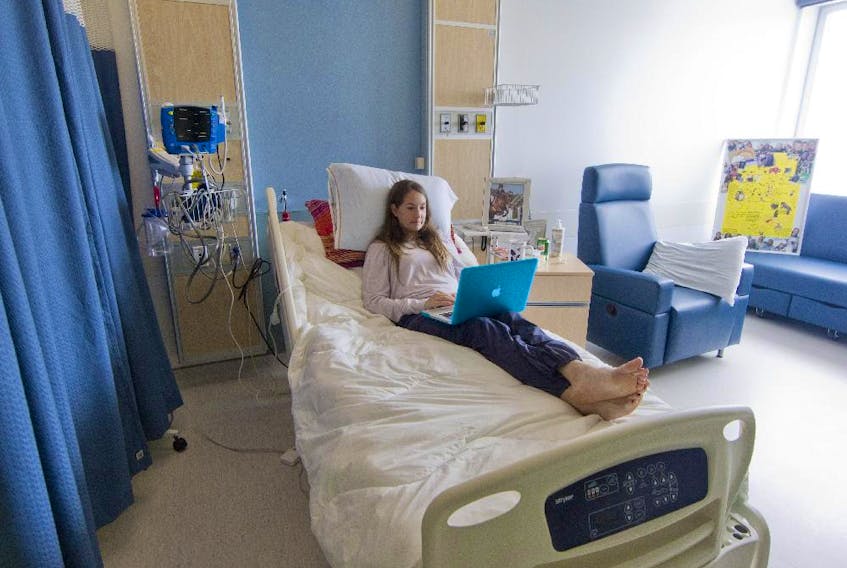Outbreaks of a potentially life-threatening intestinal superbug dropped after the McGill University Health Centre opened its superhospital in 2015 — a dramatic shift attributed to the fact that the modern facilities have exclusively single-patient rooms, a new study has concluded.
Researchers found that rates plummeted for both gut colonization and blood infections caused by Vancomycin-resistant Enterococcus (VRE), a strain of bacteria resistant to most antibiotics. The study also observed a slightly lower decline in the number of hospital colonizations by another superbug: Methicillin-resistant Staphylococcus aureus (MRSA).
“The single-patient room experience at the MUHC’s Glen site has many benefits — privacy, confidentiality, comfort, reduced noise, and improved quality of sleep,” Dr. Emily Gibson McDonald, the first author of the study, said in a statement. “Importantly, this study also found that private rooms might help reduce life-threatening infections.”
Hospitals around the world have been struggling with outbreaks of superbugs for years. In Quebec, it’s not unusual for patients to contract a VRE or MRSA infection during their hospital stay. Such hospital-acquired infections not only prolong the suffering of patients but in some cases have proved fatal.
Infection-control specialists routinely audit hospital wards to improve housekeeping and hand hygiene by staff. But the opening of the MUHC superhospital in April 2015 provided researchers with the ideal opportunity to test whether single-patient rooms (each with its own private bathroom) could make a lasting difference.
The results stunned the researchers.
“I think we were anticipating that the (VRE colonization and infection) rates would go down,” said Dr. Todd Campbell Lee, an MUHC infectious-diseases specialist and co-author of the study.
“But I’m not sure we were anticipating that the graph would look like the rates fell off of a cliff. I’m not sure that we thought the rates would almost instantaneously decrease (after the move) and then stay stable over time.”
From Jan. 1, 2013, to right before the move to the superhospital, researchers reported a total 766 VRE colonizations and 55 VRE infections of patients at the old Royal Victoria Hospital on University St. During this period, it was not unusual for as many as four patients to have to share a room, greatly increasing the likelihood that they would spread germs to each other.
By comparison, from April 2015 to March 31, 2018, the number of VRE colonizations dropped to 209 and the number of VRE infections fell to 14 at the 350-bed superhospital.
As for MRSA, the rate of colonizations per 10,000 patient days declined from 5.9 before the move to 3.5. afterward. A patient who is colonized by a superbug will not necessarily develop symptoms, but individuals who already have a weakened immune system are more likely to become infected.
The researchers did observe a slight decrease in the number of Clostridium difficile infections after the move , but determined that the difference was in line with what has occurred in hospitals across Quebec and Canada. The results were published Monday in JAMA Internal Medicine.
In addition to single-patient rooms, the MUHC has improved hand hygiene, with the staff compliance rate rising from 44 per cent in 2012 to 71 per cent in 2017-2018.
The drop in VRE infections has not only spared patients unnecessary suffering, but might also have decreased hospital costs. However, Lee cautioned that further researcher would need to bear this out, as the MUHC used to charge patients for private rooms at the old Royal Vic, something it doesn’t do at the superhospital.
Major decrease
Rate of anti-biotic resistant bacteria spread before and after MUHC superhospital move
VRE colonizations
- 2013-2015: 766
- 2015-2018: 209 (-73%)
VRE infections
- 2013-2015: 55
- 2015-2018: 14 (-75%)
MRSA colonizations per 10,000 patient days
- 2013-2015: 5.9
- 2015-2018: 3.5 (-41%)
Copyright Postmedia Network Inc., 2019









